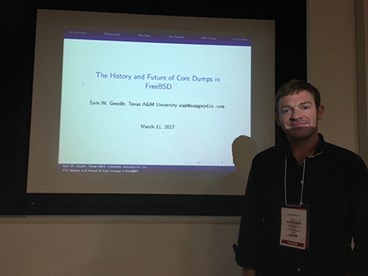 Sam Gwydir, senior in the Computer Science and Engineering Department at Texas A&M University, presented at the 2017 AsiaBSDCon on his knowledge of FreeBSD, a UNIX-like operating system similar to Mac OS X, or GNU/Linux. AsiaBSDCon2017 was held March 9-12 in Tokyo, Japan at the Tokyo University of Science.
Sam Gwydir, senior in the Computer Science and Engineering Department at Texas A&M University, presented at the 2017 AsiaBSDCon on his knowledge of FreeBSD, a UNIX-like operating system similar to Mac OS X, or GNU/Linux. AsiaBSDCon2017 was held March 9-12 in Tokyo, Japan at the Tokyo University of Science.
His talk titled “The History and Future of Core Dumps in FreeBSD,” was based on his paper for a seminar course taught by Dr. Scott Schaefer, computer science and engineering professor.
For his talk, Gwydir began with a brief background on what core dumps are and why operators might need them. He discussed the current state of the core dump facility and some of the more common extensions that are currently in use. He also assembled a history of core dump support and features from the UNIX v6 operating system through to present FreeBSD.
Dr. Marshall Kirk McKusick, who worked on the original BSD operating system and wrote the Design and Implementation series of books, which Gwydir read to begin this project, attended Gwydir’s talk.
In general, operating systems are software that manage the computer hardware and software resources for the everyday programs we use such as a web browser. Through extensive work in the subject, Gwydir has become very knowledgeable on these systems. His interest in BSD-derived operating systems was sparked after spending more than 10 years using another operating system, GNU/Linux.
“About four years ago, I wanted to run a mail server on my personal domain, I was particularly interested in security at the time,” Gwydir said. “The OpenBSD project is known for its focus on correctness and security, so it was a natural choice of operating system. Once I saw the documentation and ideas behind OpenBSD, and their mail server OpenSMTPd, I felt like my choice was made.”
Later, Gwydir became directly involved in the FreeBSD community when he attended the 2015 Grace Hopper Celebration of Women in Computing and met Deb Goodkin, the executive director the FreeBSD Foundation. She helped him obtain an internship at Groupon, where he continues to work as a systems engineer and manages the database systems which run FreeBSD.
At Groupon, he was asked to investigate recent crashes within the system. It turned out Groupon’s crash dumps, which can be used to diagnose crashes, were not working on some systems. This spurred Gwydir to begin a research project on core dumps and how to resolve this issue.
“At the same time, I was in Dr. Schaefer's seminar course and needed to write a paper on an algorithm or routine,” Gwydir said. “Naturally, I chose the core dump routine in FreeBSD. When AsiaBSDCon 2017 was announced, I realized I could turn this paper into something larger and possibly give a talk at this conference.”
For his next project, Gwydir is working on porting crash dumps to swap ZFS zvol from the operating system Illumos to FreeBSD.